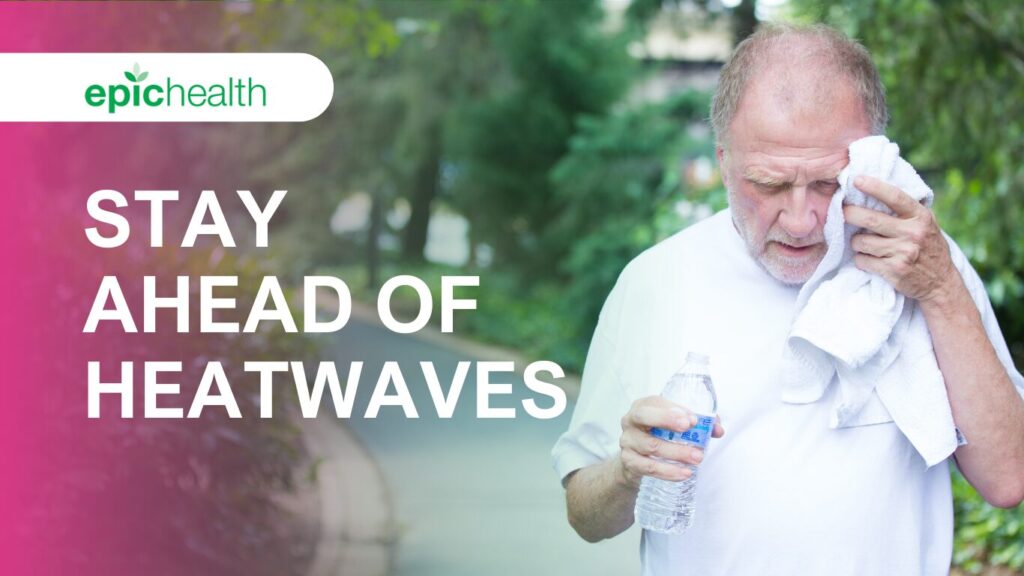Beat the Heatwave: Knowing When It’s Time to See a Doctor

As the temperatures soar in Victoria, the risk of heat-related illnesses becomes a significant concern. Did you know that those at greatest risk include older persons, infants and young children? This post aims to provide valuable insights into recognising heat-related illnesses, understanding who is at risk, and offering practical tips on staying cool and healthy.
Know the Risks
While most people find extremely hot weather and heatwaves uncomfortable, some people have a higher risk than others of becoming ill. These include:
- adults aged over 75 years, babies and young children
- people with long-term health conditions, for example heart or lung disease or diabetes
- people living with overweight or obesity
- people taking certain medicines
- people who are socially isolated
- people who work outdoors or in hot and poorly ventilated areas
- people who are not accustomed to the heat, for example, overseas visitors
Recognising Heat-Related Illnesses
It’s essential to be aware of the signs of heat-related illnesses and act promptly to seek medical attention when necessary. Common heat-related illnesses include heat exhaustion and heatstroke. Symptoms of heat exhaustion may include heavy sweating, weakness, nausea, and a rapid pulse. If left untreated, heat exhaustion can progress to heatstroke, a life-threatening condition characterised by a high body temperature, confusion, and even loss of consciousness.
Tips for Staying Safe in Extreme Heat
- Stay Hydrated: Drink plenty of water throughout the day to stay well-hydrated. Avoid excessive consumption of caffeine and alcohol, as they can contribute to dehydration.
- Keep Cool: Stay in air-conditioned spaces when possible, and use fans to circulate air. Take cool showers or baths to lower your body temperature.
- Dress Appropriately: Wear lightweight, loose-fitting, and light-colored clothing to reflect sunlight and heat. A wide-brimmed hat and sunglasses can provide additional protection.
- Plan Outdoor Activities Wisely: If possible, schedule outdoor activities during the cooler parts of the day, such as early morning or late evening. Take frequent breaks in the shade and avoid strenuous activities during peak heat hours.
- Check on Vulnerable Individuals: Keep an eye on neighbours, friends, and family members who may be at a higher risk during extreme heat. Offer assistance and ensure they are taking necessary precautions.
When to See a Doctor
If you or someone you know is experiencing symptoms of heat-related illnesses, it’s crucial to seek medical attention promptly. In Victoria, healthcare professionals are well-versed in treating heat-related conditions. Do not hesitate to visit a doctor or go to the nearest hospital emergency department if you are feeling unwell.
At Epichealth, our dedicated team of healthcare professionals can help prevent heat-related illness by implementing strategies to reduce your risk. Get in contact with us by selecting your nearest location below:
EPICHEALTH MEDICAL CLINICS
| Langwarrin |
| 230 Cranbourne Frankston Rd, Langwarrin VIC 3910 |
| (03) 9044 0010 |
| Ocean Grove Marketplace |
| 2-20 Kingston Downs Dr, Ocean Grove VIC 3226 |
| (03) 5256 2500 |
| Ocean Grove Ocean Plaza |
| 71-73 The Parade, Ocean Grove VIC 3226 |
| (03) 4246 0300 |
| Portarlington |
| 39-41 Fenwick Street, Portarlington VIC 3223 |
| (03) 4206 7200 |
| Yarra Glen |
| 1 Symonds Street, Yarra Glen VIC 3775 |
| (03) 9730 2536 |
